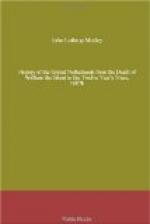In private letters to his own superintendent Strata, to Don John of Idiaquez, to the Duke of Lerma, and to Stephen Ybarra, Spinola enlarged upon the indignity about to be offered him, remonstrated vehemently against the wrong and stupidity of the proposed policy, and expressed his reliance upon the efforts of these friends of his to prevent its consummation. He intimated to Idiaquez that a new deliberation would be necessary to effect the withdrawal of the Dutch fleet—a condition not inserted in the original armistice—but that within the three months allowed for the royal ratification there would be time enough to procure the consent of the States to that measure. If the king really desired to continue the war, he had but to alter a single comma in the draught, and, out of that comma, the stadholder’s party would be certain to manufacture for him as long a war as he could possibly wish.
In a subsequent letter to the king, Spinola observed that he was well aware of the indignation created in Spain by the cessation of land hostilities without the recal of the fleet, but that nevertheless John Neyen had confidentially represented to the archdukes the royal assent as almost certain. As to the mission of Ybarra, the marquis reminded his master that the responsibility and general superintendence of the negotiations had been almost forced upon him. Certainly he had not solicited them. If another agent were now interposed, it was an advertisement to the world that the business had been badly managed. If the king wished a rupture, he had but to lift his finger or his pen; but to appoint another commissioner was an unfit reward for his faithful service. He was in the king’s hands. If his reputation were now to be destroyed, it was all over with him and his affairs. The man, whom mortals had once believed incapable, would be esteemed incapable until the end of his days.
It was too late to prevent the mission of Ybarra, who, immediately after his arrival in Brussels, began to urge in the king’s name that the words in which the provinces had been declared free by the archdukes might be expunged. What could be more childish than such diplomacy? What greater proof could be given of the incapacity of the Spanish court to learn the lesson which forty years had been teaching? Spinola again wrote a most earnest remonstrance to the king, assuring him that this was simply to break off the negotiation. It was ridiculous to suppose, he said, that concessions already made by the archdukes, ratification of which on the part of the king had been guaranteed, could now be annulled. Those acquainted with Netherland obstinacy knew better. The very possibility of the king’s refusal excited the scorn of the States-General.




